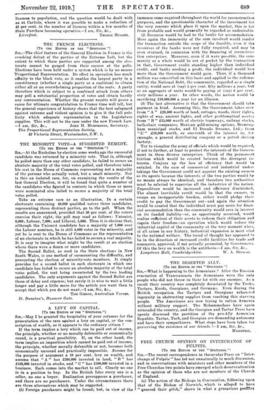THE MINORITY VOTE — A SUGGESTED REMEDY. [TO THE EDITOR OF THE
" SPECUTOR."1 SIR,—At the Rusholme by-election some weeksiago the successful candidate was returned by a minority vote. That is, although he polled more than any other candidate, he failed to secure an absolute majority of the total votes polled, and therefore takes his seat in the House of Commons representing not a majority of the persons who actually voted, but a small minority. Nor is this an isolated case, for, on examining the results of the last General Election, it will be found that quite a number of the candidates who figured in contests in which three or more were nominated also failed to secure a majority of the total votes polled.
Take an extreme case as an illustration. In a certain electorate containing 40,000 qualified voters three candidates, representing three distinct parties, go to the poll. When the results are announced, provided that 50 per cent. of the voters exercise their right, the poll may read as follows: Unionist, 8,000; Labour, 7,000; and Liberal, 5,000. Thus it is obvious that, although the Unionist candidate has a majority of 1,000 over the Labour nominee, he is still 4,000 votes in the minority, and yet he is sent to the House of Commons as the representative of an electorate in which he has failed to secure a real majority. It is easy to imagine what might be the result at an election where there were a dozen or more candidates.
The Second Ballot, as used in the State elections in New South Wales, is one method of surmounting the difficulty, and preventing the election of minority-vote members. It simply provides for a second ballot in each electorate in which one candidate has failed to secure an absolute majority of the total votes polled, the seat being recontested by the two leading candidates. The only arguments against the Second Ballot are those of delay and expense; but surely it is wise to wait a little longer and pay a little more for the article you want than to accept that which you do not want.—I am, Sir, &c., Tom Gissox, Australian Forces. St. Dunstan's, Hanover Gate.






































 Previous page
Previous page